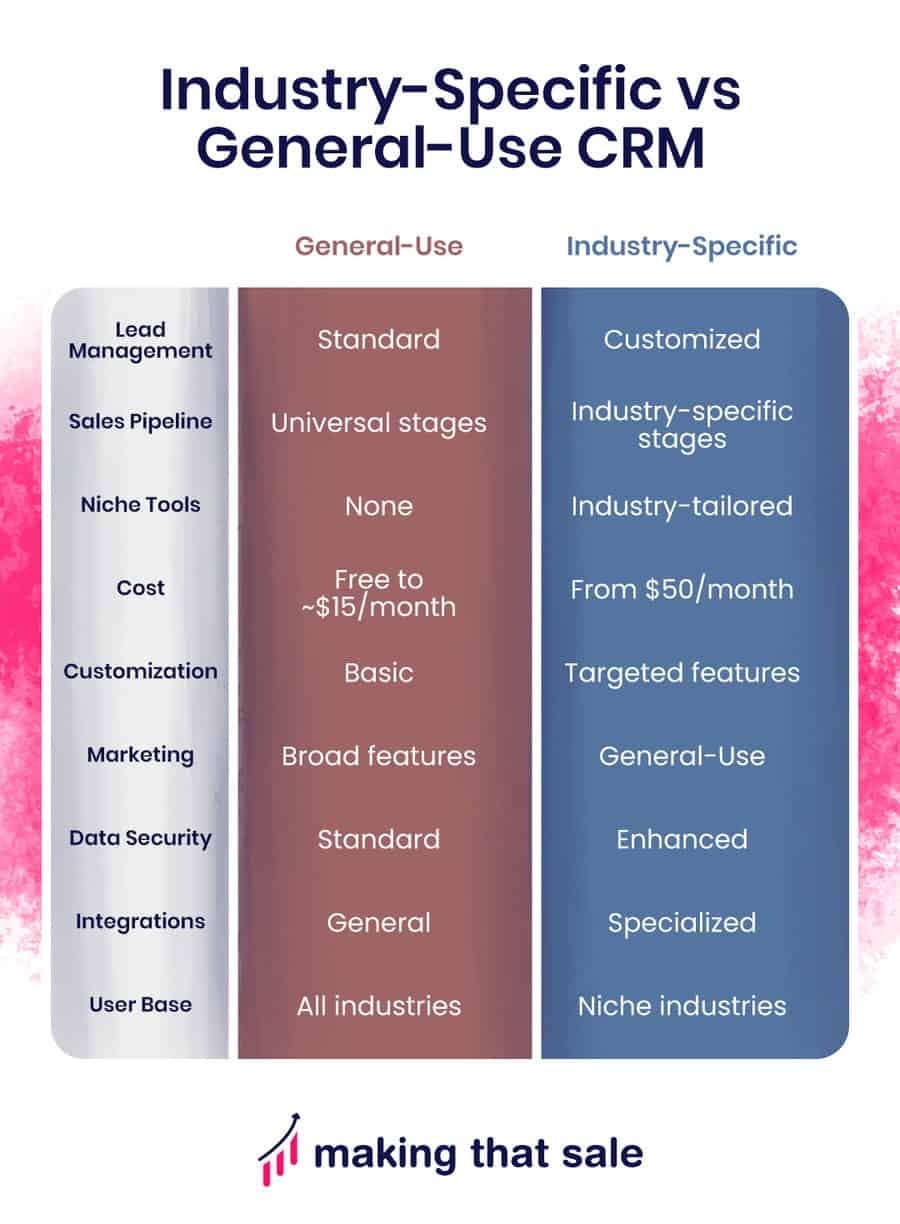Industry-Specific vs General-Use CRM
Written by: Victoria Yu
Victoria Yu is a Business Writer with expertise in Business Organization, Marketing, and Sales, holding a Bachelor’s Degree in Business Administration from the University of California, Irvine’s Paul Merage School of Business.
Edited by: Sallie Middlebrook
Sallie, holding a Ph.D. from Walden University, is an experienced writing coach and editor with a background in marketing. She has served roles in corporate communications and taught at institutions like the University of Florida.
Updated on March 3, 2025

As you begin setting up your business, a tool you might’ve heard about is a CRM system. Almost all (91%) of companies with 10 or more employees use CRM, so it seems that a CRM is just as essential to your business as the product you sell to customers. If CRMs are so popular among businesses, they must provide some amazing benefits to boost your business. Of course you’d want to research into and potentially purchase a CRM for your business to see what all the fuss is about!
But as you begin searching for a suitable CRM to purchase, you might begin to notice the utter deluge of options available to you – there are over 1,700 CRM vendors in the United States alone! How could you possibly pick only one?
A way to narrow down your options is to decide between an industry-specific or general-use CRM. But how will you know if there’s a specific CRM for your industry or if it’s even worth it? This guide will walk you through the differences between the two and help you determine which type of CRM would be best for your business.
Key Takeaways
A general-use CRM contains features that are suited for most sales organizations, such as lead management and sales pipeline management.
An industry-specific CRM contains niche tools for specialized tasks unique to certain industries, streamlining a CRM for use by businesses in a particular field.
While industry-specific CRMs tend to have more useful features for certain industries, this comes with the caveat of a larger price tag.
When deciding between purchasing a general-use or industry-specific CRM, business owners should consider their specific industry, budget, and functional needs.
What Is a General-Use CRM?
CRM stands for customer relationship management and usually refers to the software systems businesses use to track and manage incoming customers through the sales process. By recording the details of every customer interaction, businesses hope to provide a more personalized and expedited sales journey for the customer, improving customer satisfaction.
Most CRMs can handle tasks such as lead management, customer data management and analytics, sales pipeline management and analytics, and sales team activity monitoring. Depending on the vendor and price point, higher-quality CRMs might also include premium features such as marketing automation, sales team activity reporting, customer service automation, third-party integrations, and even AI-powered forecasting.
Now, these general-use CRMs are referred to as such because these tools are fairly universal – any sort of sales organization uses marketing tactics, a sales funnel, and customer service, so these CRMs can be applied to most companies who seek to use them.
However, it’s true that for certain companies in specific industries, some parts of a general-use CRM might not be as useful as others. For example, a doctor’s office may use a CRM to help manage customer information, but probably wouldn’t touch the marketing campaign tools all that often – doctors are booked to the nines as it is, there’s no need for more clients!
So, how can these types of businesses leverage the power of CRM systems without paying for features they don’t use? That’s where industry-specific CRMs come into play.

What Is an Industry-Specific CRM?
Industry-specific CRMs are CRM systems customized to have features tailored for a specific industry’s sales and management processes, including niche tools that benefit specific tasks in that industry and cutting out extraneous features.
Because of these unique and tailored features, industry-specific CRMs tend to cost a bit more than general-use CRMs.
Going back to our previous example, a healthcare CRM used by a doctor’s office might cut out mass-marketing features entirely. In its place, it would focus more on offering patient information management, data security for confidential information, inter-network referral management, back-office system integrations, and a client portal so patients could access their own medical data stored in the CRM. This way, the CRM provides more value for both the medical staff and patients alike.
Some popular industries for industry-specific CRMs are:
- Healthcare
- Insurance
- Real estate
- Accounting
- E-Commerce
- Hotels and hospitality
- Manufacturing
- Construction
- Legal services
While any industry could theoretically have an industry-specific CRM, as you’ll notice from the list, most industries with specialized CRMs usually do so because they don’t fit the mold of standard sales organizations. In a similar vein, while there are retail-specific CRMs, most retail companies would choose a general-use CRM instead, which were initially designed for retail businesses and sales organizations to begin with.
Should I Purchase an Industry-Specific or General-Use CRM?
Now, the real question: should you purchase an industry-specific CRM, or stick to a general-use one? In the following sections, let’s take a look at three key considerations you should use to guide your purchase decision and ensure the best fit for your business: your industry, budget, and needs.
Industry
A typical sales organization markets its products, guides its leads to complete a purchase, fulfills orders, and references customer information to provide good customer service and derive analyses for its next sales campaign. A general-use CRM is designed to support these standard processes.
Though we gave some examples of industries that might use an industry-specific CRM, it was in no way a conclusive list. Thus, if you determine that you operate in an industry whose standard business practices greatly differ from the above standard process, you would benefit less from a general-use CRM. An industry-specific CRM might be more useful to you to cut out extra features and include more useful ones.
Budget
The next consideration is the budget, or how much these CRMs cost.
An entry-level general-use CRM, whose only features are customer information management and sales pipeline management, can be absolutely free from certain vendors such as HubSpot. Vendors usually make general-use CRMs less expensive to begin with, assuming you’ll purchase additional add-ons or integrations to go along with it that will boost your total price. Though most standard CRMs cost around $15 per month, if you don’t need anything more than the absolute basic features of a CRM, this means you can get one that’s virtually free.
On the other hand, as they contain more unique and valuable features, industry-specific CRMs tend to cost more. Though price also depends on the industry, let’s look at healthcare CRMs for an example: according to Capterra’s healthcare CRM pricing guide, a reputable healthcare CRM averages at around $50 per month. Some even go as high as $400 per month!
Thus, if your business is just starting out and is strapped for cash, you might want to consider a general-use CRM first. But if you have the money to spare and want all of your features in one neat package, an industry-specific CRM is the way to go.
Your Needs
Finally, an overarching consideration of whether or not you should choose an industry-specific CRM or not is the specific needs your business requires from its CRM, along with whether you can get those same features from another CRM.
For example, let’s say you run a real estate business. While purchasing the Premier Agent CRM from real estate titan Zillow might give you exclusive access to listings and client data through the parent company, it could be the case that you’re simply looking to improve your communication response time with prospects and don’t need any fancy features. In that case, even though an industry-specific CRM is available to you, you might be better off with a communication-focused general CRM.
As such, rather than simply going with the CRM that matches your industry, you should carefully consider the exact features you’re looking for in a CRM, and see if you can get a more economical solution elsewhere. You may also find it more advantageous and flexible to purchase a general-use CRM, and only pay for the specific integrations or features you need.
Conclusion
When shopping for a CRM, you may be caught between a general-use or industry-specific CRM. While an industry-specific CRM is generally more expensive, it also includes a personalized assortment of unique tools catered to your industry’s specific processes, which could make it well worth the cost.
That’s why it’s important to weigh your industry processes, budget, and specific needs when deciding between a general-use or industry-specific CRM, to ensure that you make the right choice for your immediate business needs. While any sort of CRM may function passably well, if you take the extra time to find a CRM that fits your business like a glove, your business is sure to flourish both financially and functionally.
FAQs
What are some situations where I shouldn’t purchase a CRM?
Though we’ve been talking about whether to buy a general-use or industry-specific CRM, there are also cases where a company might not benefit from either type of CRM. For example, if your company operates in a relatively small industry and only sees a maximum of 10 customers at a time, you may be perfectly capable of managing customers with Excel or pencil-and-paper instead. The same goes for if your business relies on a small number of repeat customers; in that case, it may be better to assign designated account managers to build personalized relationships instead.
Additionally, you should never purchase a CRM if your business can’t afford the recurring cost. Luckily, as we mentioned before, some CRM vendors offer free entry-level CRMs.
What if I can’t find an industry-specific CRM for my business?
If your business is so niche that there isn’t an industry-specific CRM available or you’re otherwise unable to find a suitable CRM, some software developers such as Steel Kiwi can build a custom-made CRM system for your business. These will cost quite a lot of money, however.
What if I still can’t decide between a general-use or industry-specific CRM?
If, after all this deliberation, you still can’t decide between a general-use or industry-specific CRM, you should ask for a free trial of both types and see which one suits your business better. Though this can take quite a lot of time, effort, and adjustment for your business to adapt to both of these systems, this will give you and your employees the best insight into how each CRM suits your business processes. From there, you can discuss with your employees and select the most suitable CRM.
